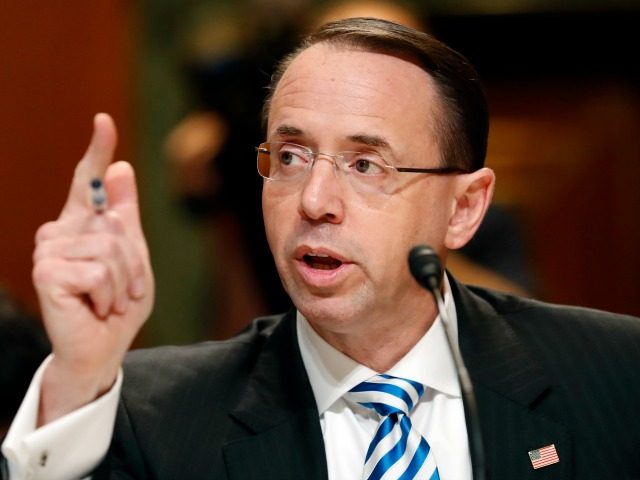Liberal George Washington University professor Jonathan Turley has published an op-ed arguing that Deputy Attorney General Rod Rosenstein should recuse himself from the ongoing investigation into alleged Russian intervention in the 2016 presidential election.
Rosenstein became Acting Attorney General for the purposes of the investigation when Attorney General Jeff Sessions recused himself in March because of his role in the campaign.
In an op-ed for The Hill, Turley says that Sessions was right to recuse himself — but that his deputy ought to follow.
He provides three basic reasons. One is that Rosenstein made a mistake by appointing Robert Mueller as Special Counsel after then-FBI director James Comey was fired in May. Mueller was known to be close to Comey, due to their past work at the Department of Justice. Moreover, Turley notes, “Mueller interviewed for Comey’s job, and Trump presumably spoke to Mueller about his reasons for firing Comey.” That created ethical conflicts for Mueller.
Second, Turley argues that Rosenstein gave Mueller a “strikingly broad” mandate, one that allows Mueller not only to investigate Russia’s involvement in the election, but also “any matters that arose or may arise directly from the investigation.” Turley says that Rosenstein’s declaration on Fox News Sunday this weekend that Mueller was not authorized to conduct a “fishing expedition” cannot be enforced on the basis of Mueller’s overly broad mandate. While Mueller is required to consult Rosenstein if he wants to broaden his jurisdiction beyond the election itself, Turley notes, “It is not clear whether Mueller had such a discussion before bringing on a team of prosecutors focused on financial fraud and foreign bribery or pursuing previous Trump transactions and business deals.”
Finally, Turley notes that Rosenstein could be a witness himself in the investigation — both for the prosecution and the defense — if Mueller pursues accusations of obstruction of justice against Trump. It was Rosenstein who wrote the crucial memo justifying Comey’s firing. “As someone who supported the firing, he may be as important to the defense as to the prosecution in showing the independent grounds for terminating Comey,” Turley observes.
The growing consensus is that Mueller and his team — virtually a boutique law firm specializing in conspiracy theory litigation — will come up with “something,” if only to justify its own efforts, expense, and exposure.
If that “something” has little to do with the election itself, the investigation could be seen as illegitimate — a problem that begins with dubious ethics and overlapping conflicts of interest, centered around Rosenstein as well as Mueller.
Joel B. Pollak is Senior Editor-at-Large at Breitbart News. He was named one of the “most influential” people in news media in 2016. He is the co-author of How Trump Won: The Inside Story of a Revolution, is available from Regnery. Follow him on Twitter at @joelpollak.

COMMENTS
Please let us know if you're having issues with commenting.